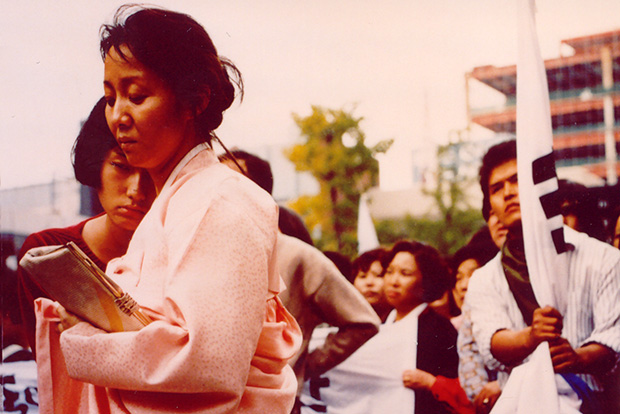A Petal 꽃잎
Written by Cole Clouse
 The violence that occurred in Gwangju on May 18, 1980 is referred to in various ways: The Gwangju Uprising (in historical text), the May 18 Democratic Uprising (by UNESCO), and (to some in Jeollanam-do), the Gwangju Massacre. For the main character of the movie A Petal, the event had no name. For the character, it was simply the end of normalcy and any attempt at what humanity she could have had.
The violence that occurred in Gwangju on May 18, 1980 is referred to in various ways: The Gwangju Uprising (in historical text), the May 18 Democratic Uprising (by UNESCO), and (to some in Jeollanam-do), the Gwangju Massacre. For the main character of the movie A Petal, the event had no name. For the character, it was simply the end of normalcy and any attempt at what humanity she could have had.
The introduction to our no-name protagonist, Girl (for ease of reading), shows us a normal pre-teen dancing, singing popular songs, and trying to impress older boys. But within the first ten minutes of the movie, we see her become a disheveled mess: crooked and rotting teeth, homeless, and non-verbal. Meeting a man by chance, she follows him, only to be raped. Yet, she doesn’t know any better and follows him for some type of security. She has both a roof and food, dirty as they are. And still the rapes continue.
To say this would be the worst of the movie is wishful thinking. Lee Jung-hyun (a famous pop singer from years past) gives a fantastic performance as a broken down, lifeless child who can’t even make sense of the world around her. Her life is haunted by memories of where her life, in essence, ended. While in Gwangju, Girl is caught up in the sudden rush of political violence. Protestors to Chun Doo-hwan’s military leadership are caught in a violent clash with soldiers. Girl is left alive and somehow ends up grouped with dead corpses in the aftermath. As the bodies are dumped by soldiers, Girl emerges a survivor but carrying the horror of the event with her. She continues on without a family as none of them survived the tragedy.
Coming into this movie, I was surprised at how little Gwangju factored into the run-time and in its effect on the protagonist. Few scenes are dedicated to Girl during the Gwangju Uprising itself. Instead, we are shown the after-effects that continue to haunt her: the aforementioned corpse escape, a ghostly appearance on a train, self-mutilation with a pair of scissors, beautifully drawn but grotesque animated nightmares that prevent her from even escaping during sleep. It almost feels as if Girl is personifying the Korean people. A horrible incident occurred. Physically surviving, but emotionally and mentally scarred, Girl is left wandering aimlessly from place to place, trying to make sense of the world.
A Petal is not an easy watch. The short run-time is to the benefit of the viewing audience. While there is welcome respite from seeing Girl suffer, this creates a detriment to other parts of the movie. A sub-plot of Girl’s friend, and scenes of the documentary crew trying to locate Girl, are underdeveloped. The timelines are told out of chronological order, but even then, it feels they are only used to show that Girl does have some sort of future love and hope. And maybe not just for her, but for the countless like her that we have in our world today. As one of the crew says, “If you see the girl on the streets begging, don’t act like she isn’t there.” People may be quick to fight but are slow to pick up the pieces of the conflict. What results is Girl: the shell of a person to be used, abused, and discarded.
Note: The acts occurring in Gwangju from May 18 through 27, 1980, are a controversial topic for Koreans to this day. Sides are very passionate for their own opinions about what happened. As a foreigner/guest in this country, I speak as neutrally as I can in reviewing this movie in hopes of not only respecting the views of the readers, but also of those who died during the nine days of violence.
The Author
Cole loves watching movies. Movies are meant to be watched. It’s a match made in heaven.






Thank you for your input, Don! – admin